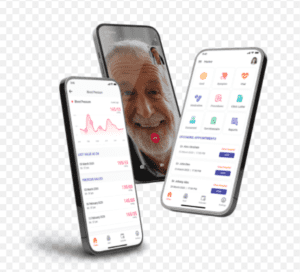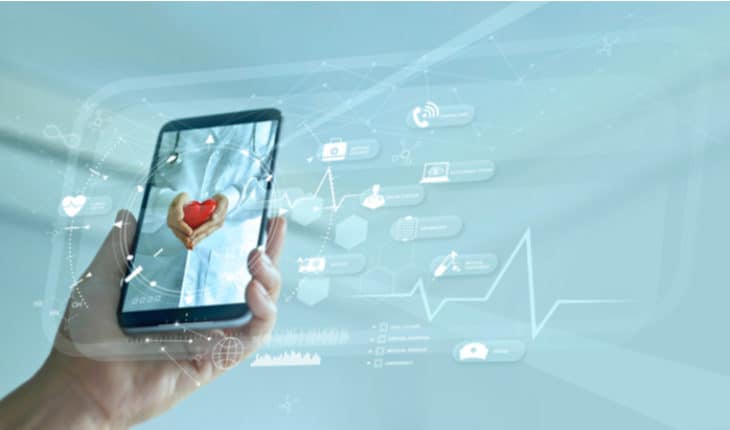NHS heart specialist develops first London-wide specialty virtual ward tech: London Cardiac Remote Monitoring Programme to support cardiac surgery waiting list pathway with Ortus-iHealth.
One of the first, big implementations of remote monitoring technology in the UK will reduce risk and improve care for up to 8,000 patients waiting for heart surgery using the Ortus platform
Eight specialist centres could also deploy the information and communications platform to improve services for 1.2 million people living with heart conditions in the capital
Thousands of Londoners with heart conditions will receive better care thanks to a London Cardiac Remote Monitoring Programme that will be rolled-out using technology from Ortus-iHealth.
The programme has been commissioned on behalf of the South and North London Cardiac Operational Delivery Networks, with £750,000 of transformation funding from NHSX (now part of the NHS England transformation directorate).
It will enable the eight tertiary heart centres based at the capital’s major hospitals to adopt the Ortus-iHealth platform, which was developed by Dr Debashish Das, a consultant cardiologist at Barts Health NHS Trust.
Initially, patients waiting for heart surgery will use the system to complete questionnaires and submit data to a “virtual ward’ dashboard monitored by their clinical team.
Patients showing deterioration will be identified, prioritised and offered support by message, video consultation or an in-clinic consultation as appropriate.
Stephen Edmondson, NHSE Cardiac Network clinical director, London Region, said: “We have a responsibility to keep our patients as safe as possible whilst they wait longer for life saving cardiac surgery due to the impact of the pandemic. This means we have to identify those patients who are deteriorating and offer earlier intervention when needed.
“The Ortus digital platform which has been procured on behalf of all the major London cardiac centres creates a patient and clinician user friendly digital ward environment to continuously monitor and reprioritise our patients.

“We were keen that any such digital solution would improve the overall patient experience. The Ortus platform which can be web or app based also provides digitised information concerning their particular treatment, digitised consent and digitised aftercare and follow up.”
Crucially at a time of stretched resources and capacity the Ortus platform will also facilitate earlier discharge into a safer and more responsive aftercare setting.
London is the first city in the UK to run a remote monitoring programme on this scale. The eight specialist heart centres that will be involved not only treat patients from across the capital, but from referring hospitals from counties around the M25.
The initial focus is on the heart surgery pathway because post-pandemic there are 1,400 patients on the cardiac surgery waiting list, and it is growing by 100 patients a week.
The ODNs that have commissioned the programme want to reduce the risk of these patients becoming sicker or being admitted to hospital in an emergency as much as possible. They also want to make sure that these patients receive an equitable service.
All the hospitals involved in the programme will adopt the same patient pathways, the same state of the art technology, and deliver the same service to patients, wherever they live. Eventually, 8,000 patients could benefit.
Gary McAllister, chief technology officer at OneLondon, a collaboration between London’s integrated care systems and London Ambulance Service, said: “Remote monitoring and virtual wards are a fundamental enabler for sustainable and transformed clinical pathways. The procurement of Ortus will deliver a baseline capability for London, providing cardiac and other services with the tools to develop innovative, new ways of working.
“Fundamental to the delivery of transformed cardiac services is the interoperability of Ortus with the London Care Record, extending the reach of cardiac information to all services across the region. Region-wide access to cardiac information will improve the quality, efficiency and safety of care for patients cared for by London trusts.”
Ortus-iHealth can also be used to support patients on other cardiac pathways, to give them information about their condition, help them prepare for treatment, and to make sure they spend as little time in hospital as possible.
This means that, once implemented, there will be the opportunity to extend the use of the Ortus platform to support the 1.2 million people in London with heart conditions.
For example, there could be the opportunity to support patients who have been discharged after treatment for a heart attack. These patients need to take increasingly strong doses of medicine to strengthen the heart, in a process known as titration.
Dr Das and his team originally developed Ortus-iHealth because they wanted to make sure the patients treated at Barts Heart Centre were being titrated properly, and responding to ongoing care.
During the Covid-19 pandemic, Ortus-iHealth meant they could also discharge patients 1-2 days after surgery, rather than the usual 3-5 days, to reduce their risk of contracting the disease in hospital.
Experiences like this have triggered interest in the idea of running virtual wards or remote monitoring programmes in the NHS.
But Dr Das stresses that to be safe and effective they must use technology to collect and analyse data and to keep patients in touch with their clinicians.
“You cannot just send somebody home with a blood pressure monitor,” he said. “You need a dashboard to collect and analyse that data, and you need easy communication between the patient and the clinician.
“If I am working at my hospital, I will do a ward round, and look at the observations, and talk to the patient, and make a plan; and if I am working on a virtual ward, I need to be able to do exactly the same things. That’s why we built Ortus-iHealth.
“It collects quantitative data, like blood pressure readings and patient-inputted symptoms, and qualitative data, like responses to questionnaires. It displays that data on a dashboard, alongside a communications link to the patient.
“That means I can message you to say: ‘I’ve seen your observations, and they look fine’ or: ‘I’ve been alerted to a problem, and this is what we are going to do’.
“What is so exciting about the London Cardiac Remote Monitoring Programme is that it has been developed by experts who have already tried out virtual wards and who understand what is needed to make them work.
“It’s the first, real, pan-London remote monitoring programme for any clinical specialty, and we’re delighted that our solution has been recognised as the best option to support both clinicians and patients.”
About Ortus-iHealth:
Ortus-iHealth is a digital healthcare company, formed in 2017 by Barts Hospital consultant cardiologist Dr Debashish Das. It provides a digital outpatients solution facilitating the effective delivery of treatments from referral to discharge.
It offers patient and clinician portals that support the scheduling of remote, asynchronous, or local consultations with remote collection of PROMs, symptoms and vitals in advance of consultations and which are reviewable throughout the patient journey. Clinical dashboards and patient journey content are configured for specific condition and pathway needs, enabling consultations and reviews to be determined and prioritised by clinicians based upon clinical need and PIFU requests.
Configurable pathways can include multiple elements in automated workflows, including remote monitoring, consent, and patient education content. The aim is maintaining engagement with patients, while increasing access, reducing DNAs, and easing the pressure on clinics. With integration to PAS and EHR platforms, Ortus is a single solution for all Outpatient and perioperative needs.
Ortus’ development will focus on enhancing decision support through the use of AI and wider integration, further supporting clinicians and their patients with the best informed and transparent, experience through the treatment journey.
- Combination of drugs could prevent thousands of heart attacks - 21st April 2025
- UQ Study Links Poor Teen Diets to Heavy Social Media Use - 21st April 2025
- Gut microbiome could delay onset of type 1 diabetes - 3rd April 2025






